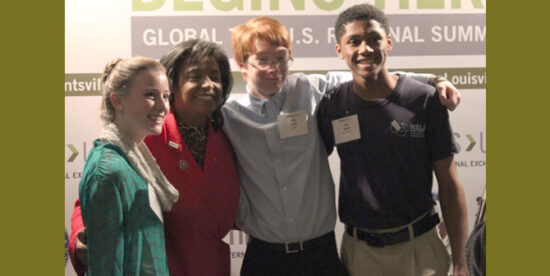
“International Education Week affects you, even if you don’t think it does.” As a recent college graduate, I find myself telling this to my friends who work in everything from finance to real estate to pharmaceuticals. Why? Because while they may not be thinking of their fields in terms of foreign policy objectives or international relations, they are more involved than they think.
Visit any college campus and you will see the impact of an increasingly globalized world. Whether it is in the courses offered by the university, the different activities available, the make-up of the student body, and the number of study abroad programs, students are connected to the wider world beyond the community they grew up in. And their international experiences, especially for those who study abroad, leaves a profoundly positive mark on the participants’ mindset and character. Assistant Secretary of State for Educational and Cultural Affairs Evan Ryan’s recent online chat was filled with people sharing stories of how exchange programs in college have changed their lives. When framing International Education Week in this way my college friends can understand its personal importance and why it truly does matter.
The U.S. Departments of State and Education created International Education Week in 2000. Their goal: to promote programs that prepare Americans for an increasingly interconnected world, while attracting future leaders from abroad to study, learn, and exchange experiences in the United States. Our Diplomacy Begins Here regional summit in Huntsville, Alabama, showcased how millennials and our schools are shaping a common global future. All of us enjoyed hearing frank accounts of millennials and young professionals about the importance of international education and student exchanges. In our rapidly globalizing world, their stories underscored the importance of a multifaceted perspective which international exchanges encourage. Their views were precisely the viewpoint the Alabama summit both amplified and fostered.
One Summit session featured a speech delivered by author and political analyst John Zogby, which focused on the differences between millennials and the baby-boom generation. The renowned pollster discussed the different ways each generation approaches and views the world and its challenges. His remarks resonated with the core objective of International Education Week. Zogby’s research revealed that “74 percent of millennials say they want to work for an organization that allows them to help make the world a better place.”
their stories underscored the importance of a multifaceted perspective which international exchanges encourage.
Zogby noted that “millennials think globally even in their own backyards.” The young professional participants in Huntsville were prime examples of what he meant.Representatives of the National Association for the Prevention of Starvation discussed how they provide humanitarian aid and educational support as a first response to a crisis, particularly to children at risk. Darla Price, one of the panelists at the Summit and a volunteer there, shared the details of the rewards and benefits she enjoys through her volunteer work with the National Association for the Prevention of Starvation. While never doubting the value of the short-term assistance and relief effort she gave, Price told the audience the lasting relationships changed perspectives she experienced were, for her, the most profound benefits of the help she rendered.
The Diplomacy Begins Here summit series is advancing International Education Week’s primary goal of demonstrating to Americans why all of us benefit from foreign study and the presence of international students. Thanks to Darla, and many other conference participants, Global Ties U.S. was able to showcase the millennial generation and their talents. Their ability to mold the future global environment, and their long-lasting commitment to international education and exchange programs, will benefit themselves and future generations of Americans.
Jona Elwell, Global Ties U.S
